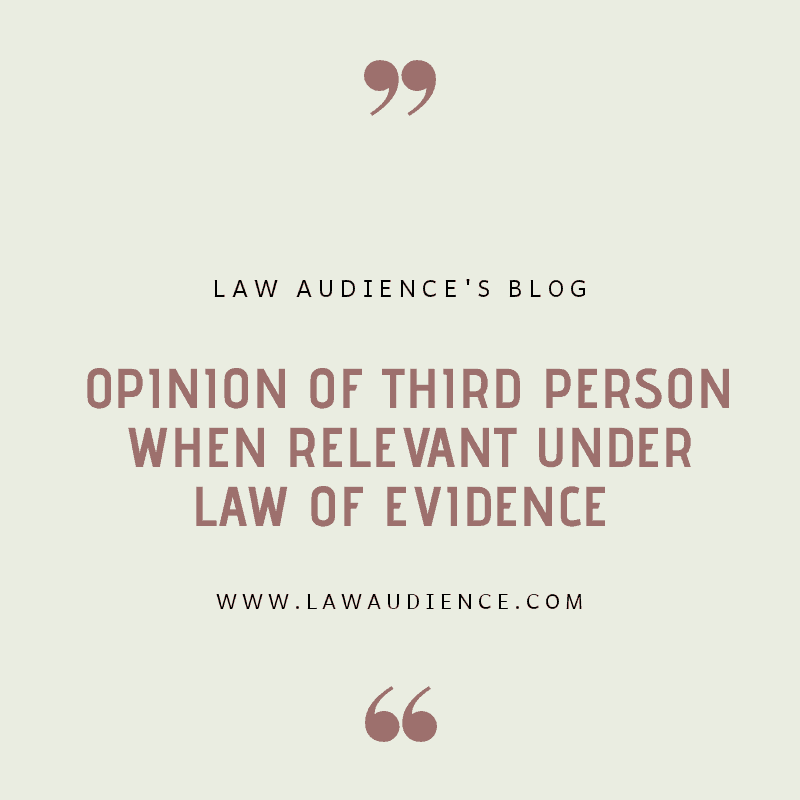AUTHORED BY: MS. KAJAL KUKREJA, LL.B, FINAL YEAR STUDENT AT NEW LAW COLLEGE, BHARATI VIDYAPEETH DEEMED UNIVERSITY & RESEARCH WRITER AT LAW AUDIENCE.
I. ABSTRACT:
This short article is focused on explaining the concept of “Opinion of Third Person when Relevant” which is explained under Sections 45 to 51 of the Law of Evidence Act, 1872. The main motive of the Act is to prohibit unreliability in the admissibility of the evidence and to establish more true and consistent rules. This law gives a procedure of rules which helps in proving the facts of the case. This Act applies to all the judicial proceedings. Whether it is civil or criminal proceedings, the rules of evidence are same. There are various types of evidence which comes under this law.
II. APPLICATION & NON-APPLICATION:
The provisions of the Act enforced in September 1872 from its first day. It is applicable to the whole of India except Jammu & Kashmir. It will not be applicable to those proceedings which are not judicial.
III. INTRODUCTION:
Under the Indian Evidence Act, Sections 5 to 55 deal with the appropriateness of the facts. Sections 45 to 51 of the Act deal with the relevancy of opinion of the third person. Who are basically called as expert opinion. These people are not connected to the proceedings in any manner which is pending in the Court. It is an exception which is based on the principle that the Court cannot give an opinion on such matters which are complex and the Court cannot give judgement without the support of the person who has skills and knowledge on such issue.
IV. PROVISIONS RELATING TO OPINION OF THIRD PERSON WHEN RELEVANT UNDER LAW OF EVIDENCE:
(i) WHO IS AN EXPERT (SECTION 45)[1]:
The definition of an expert is given in Section 45 of the Indian Evidence Act, 1872. It means a person who has special skills, knowledge or experience in that particular field like whether the death of c was caused by poison. The subject matters of inquiry are mentioned below:
- Handwriting
- Art
- Foreign Law
- Impression of finger
- Science
The skills are collected by practice, scrutiny and proper study which are done by him Example, an expert of a fingerprint, a medical officer etc. The Court can take the assistance of those experts in any complex issue in which there is a need for that expert person.
(i.i) DUTY OF THE EXPERT:
The duty of the expert lies in the following ways:
- He is not a witness to any fact.
- The evidence must be of advisory character.
- An expert cannot decide the case.
- His duty is to tell the criteria for checking the accuracy of the conclusion so that the judge can give the judgement independently by the evidence.
(ii) SECTION 45A[2]:
This section deals with the opinion of the examiner of electronic evidence. It means when in any suit, the information is stored in an electronic source like a computer and the Court has to give judgement on it then there is a need to take an opinion of the expert of electronic evidence which deals with the Section79A of the Information Technology Act.
(iii) SECTION 46[3]:
This section deals with the relevancy of opinion under some circumstances. It says that the facts are not otherwise relevant, will be relevant if they assist or incompatible with the expert’s opinion.
(iv) SECTION 47[4]:
This section deals with the opinion of the expert of the handwriting when relevant. When the Court has to provide an opinion on the document whether it is signed or written by that person or any other person then there is a need of expert of handwriting. It is a relevant fact in this case.
(v) SECTION 47A[5]:
In this section when the Court has to give an opinion on the digital signature of any person, then the opinion of Certifying Authority who has issued that signature will be considered as a relevant fact.
(vi) SECTION 48[6]:
This section deals with the opinion of any custom or right. When the Court has to give an opinion on any general right or custom, the opinion is to be given on the existence of such right or custom if it existed. Example- the villagers right to use the water of any particular well is considered as a general right under this section. “The custom or right includes any class of person”.
(vii) SECTION 49[7]:
This section deals with the opinion which is relevant in tenets, usages. When the Court has to give an opinion on:
- The usages, tenets of any family.
- Any religious or foundation of charitable purpose.
- The terms and their meanings which are used in any particular district by any particular class of people.
- The opinions of persons having special knowledge are considered as relevant facts under this section.
(ix) SECTION 50[8]:
This section is made to give an opinion on the relationship when needed. In this section when the Court has to provide opinion on the relationship of an individual with another which is expressed by conduct. It is relevant that there is the existence of their relationship, as a member of the family has special knowledge about this will be considered as a relevant fact.
The opinion will not be enough to prove a marriage in the proceedings of the Indian Divorce Act or any prosecution with relevant sections under Indian Penal Code, 1860. Example, Whether C and D are married; the fact will be received if they will be treated as husband and wife by members and the friends.
(x) SECTION 51[9]:
It is given whenever there is a need to give an opinion of any living person, and then the grounds of giving such opinion are also relevant.
(x.i) EVIDENTIARY VALUE OF EXPERT WITNESSES:
According to Section 45, before characterising any person as an expert, it is essential that there must be some records that he is specialised in that particular field. He has knowledge of the same. He must have to do a special study of that subject and experience also.
In a renowned case S. Gopala Reddy v. State of A.P[10]:
It was held that the evidence of an Expert is a weak type of evidence and the Court regarded it is unsafe to rely upon without the independent and accurate confirmation.
V. CONCLUSION:
Through this article, the author wants to conclude that the expert witness plays a vital role in assisting the judge to decide the case which is come before him. Sometimes, the judges cannot give proper decision from the facts which are expressed by the witnesses, and then there is a need to take help from the expert opinion. However, the opinion of the expert is considered as the weak form of evidence because there are some cases in which the expert has no sufficient knowledge. The expert must be specialised in that particular skill. He must have experience and has done a deep study of that skill. Therefore, the Jury can reject or accept the opinion of the experts.
[1] Section 45, The Indian Evidence Act, 1872 (India).
[2] Section 45A, The Indian Evidence Act, 1872 (India).
[3] Section 46, The Indian Evidence Act, 1872 (India).
[4] Section 47, The Indian Evidence Act, 1872 (India).
[5] Section 47A, The Indian Evidence Act, 1872 (India).
[6] Section 48, The Indian Evidence Act, 1872 (India).
[7] Section 49, The Indian Evidence Act, 1872 (India).
[8] Section 50, The Indian Evidence Act, 1872 (India).
[9] Section 51, The Indian Evidence Act, 1872 (India).
[10] 1996 S.C.C. (4) 596: JT 1996 (6) 268 (India).



